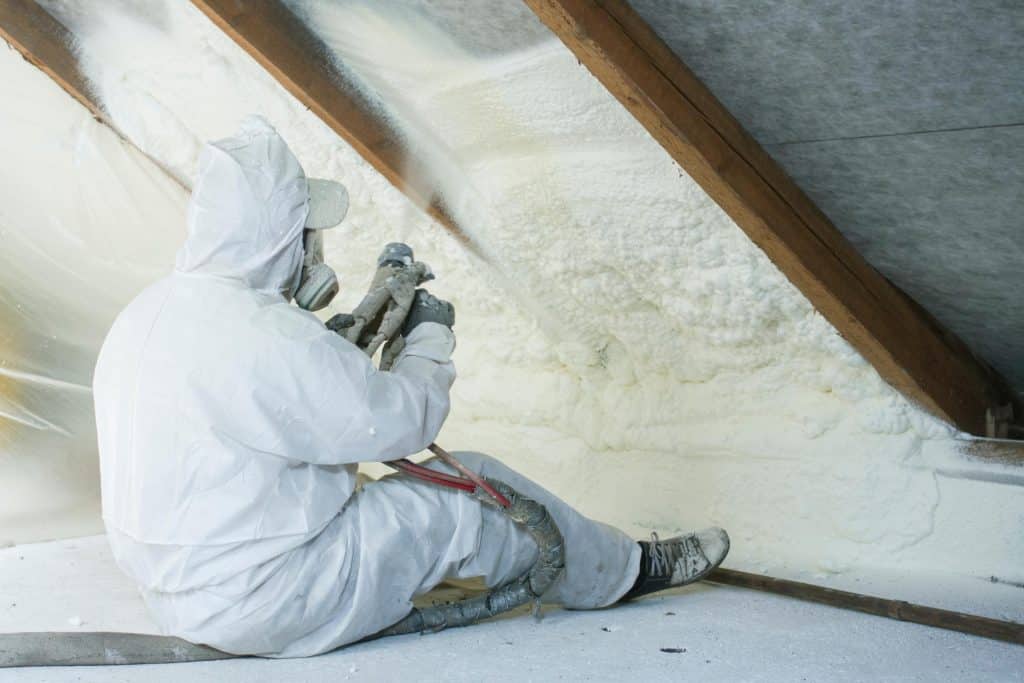
Spray foam insulation has quickly become one of the most popular choices for insulating homes and businesses due to its superior energy efficiency, durability, and versatility. As spray foam contractors, you are at the forefront of helping clients make informed decisions about the best insulation options available. In this post, we’ll dive into what spray foam insulation is, its many benefits, and the variety of applications it’s ideal for. We will also help clarify why it’s an excellent choice for homeowners and businesses looking to improve their energy efficiency and comfort.
At Spray Foam Genius Marketing, we specialize in providing spray foam contractors with professional SEO services, Google Business Profile optimization, and local SEO strategies that help your business gain visibility and attract more leads. Understanding the key advantages of spray foam insulation is crucial for building trust with potential clients and expanding your business in this growing industry.
What is Spray Foam Insulation?
Spray foam insulation is a modern and highly effective type of insulation that is applied using a spray system. It starts as a liquid made from a mixture of isocyanate and polyol resin. Once these two components are combined, they react and expand rapidly, forming a thick foam layer that fills gaps, cracks, and cavities, creating an airtight seal. This material hardens quickly, providing insulation that helps regulate indoor temperatures.
There are two main types of spray foam insulation:
1. Open-Cell Spray Foam:
This type of foam has a low density and is softer and more flexible. It is excellent for soundproofing and provides good insulation in spaces like walls and ceilings. Open-cell foam is more affordable compared to closed-cell foam but has a lower R-value.
2. Closed-Cell Spray Foam:
This type has a higher density, making it more rigid and durable. Closed-cell foam offers higher insulation performance and is moisture-resistant, which makes it ideal for areas prone to water damage, such as basements and crawl spaces. Closed-cell foam has a higher R-value per inch, providing better insulation.
Both types of spray foam insulation are highly effective at sealing air leaks, reducing energy consumption, and improving indoor comfort.
Benefits of Spray Foam Insulation

Spray foam insulation offers a wide array of benefits that make it one of the most energy-efficient and cost-effective insulation options available. Below, we’ll discuss these advantages in more detail:
1. Superior Energy Efficiency
One of the main reasons spray foam insulation is so popular is its superior energy efficiency. Because spray foam expands upon application, it fills all gaps, cracks, and voids in a building’s structure, creating an airtight seal. This means that it prevents warm air from escaping in the winter and cool air from escaping in the summer, reducing the strain on heating and cooling systems.
This airtight seal helps maintain a consistent indoor temperature, leading to significant reductions in energy consumption and lower utility bills. In fact, studies have shown that spray foam insulation can reduce energy costs by up to 30%.
2. Increased Durability and Longevity
Unlike other insulation materials that may settle, sag, or degrade over time, spray foam insulation is long-lasting and maintains its form and function for many years. When properly installed, spray foam will not shrink, sag, or settle, ensuring that your clients get the maximum performance for the lifetime of the product.
Additionally, closed-cell spray foam is moisture-resistant and acts as a vapor barrier, preventing mold and mildew growth, which can cause serious damage to a building’s structure.
3. Noise Reduction and Soundproofing
Spray foam insulation provides excellent soundproofing benefits, particularly open-cell foam. The foam’s ability to fill voids and gaps within walls, ceilings, and floors reduces the amount of sound that passes through. This is especially valuable for homes and businesses located in noisy environments, as it can significantly improve the quality of life and work.
For example, spray foam insulation is an excellent choice for home theaters, offices, or buildings located near busy streets or airports.
4. Environmentally Friendly
Spray foam insulation can help lower a building’s carbon footprint by improving energy efficiency and reducing the need for heating and cooling systems. The reduced energy consumption means that fewer resources are used to maintain comfortable temperatures, leading to lower greenhouse gas emissions.
Moreover, spray foam manufacturers have increasingly switched to using environmentally friendly blowing agents that have a much lower impact on the ozone layer than older, harmful chemicals.
5. Enhanced Air Quality
By sealing cracks, gaps, and crevices in the building’s structure, spray foam insulation improves indoor air quality by reducing the infiltration of dust, pollen, and outdoor pollutants. This is particularly beneficial for people with asthma or allergies, as spray foam helps to keep the indoor environment cleaner and healthier.
Moreover, spray foam prevents the entry of moisture, which can cause the growth of mold and mildew, further improving air quality.
6. Increased Property Value
Installing spray foam insulation can increase the overall value of a property. Homebuyers and commercial property investors are often looking for energy-efficient buildings that help reduce long-term operating costs. Properties with spray foam insulation are seen as more sustainable, and the reduced energy consumption may result in higher property appraisals.
7. Pest Resistance
Spray foam insulation can also help keep pests like insects and rodents from entering a building. Since the foam expands to fill every gap, there is little room for pests to sneak through, making spray foam an excellent option for pest control.
Applications of Spray Foam Insulation
Spray foam insulation is incredibly versatile, making it suitable for a wide range of applications in both residential and commercial settings. Below, we’ll explore some of the most common uses for spray foam insulation:
1. Residential Homes
In residential properties, spray foam insulation is commonly applied in attics, walls, floors, and basements. The insulation helps homeowners maintain a consistent temperature inside their homes, reduces noise, and improves energy efficiency.
Spray foam is particularly beneficial for homes in climates with extreme temperatures, as it helps keep heating and cooling systems running efficiently year-round.
2. Commercial Buildings
Commercial buildings such as offices, warehouses, and retail spaces can benefit greatly from spray foam insulation. For businesses, maintaining energy efficiency is essential for reducing overhead costs and improving bottom-line profitability.
Spray foam insulation is commonly used in commercial buildings for insulating walls, roofs, and HVAC systems. Its ability to create an airtight seal makes it ideal for reducing energy costs and maintaining temperature stability in large spaces.
3. Industrial Applications
In industrial settings, spray foam insulation is used for its superior thermal performance and moisture resistance. It is particularly useful for insulating pipes, tanks, and other equipment in warehouses, factories, and manufacturing facilities where maintaining temperature and preventing condensation are critical.
Closed-cell spray foam is highly effective in preventing heat loss and protecting against corrosion in these types of applications.
4. Retrofit Insulation
Spray foam insulation can be used in retrofitting projects, especially in older homes and buildings where traditional insulation may have settled or deteriorated over time. Spray foam can be applied in existing structures to fill gaps, improve energy efficiency, and provide additional moisture protection without requiring major renovations.
5. Soundproofing in Special Environments
Spray foam insulation is also commonly used for soundproofing in areas where noise reduction is essential. This includes home theaters, music studios, apartments, and hotels, where controlling noise levels between rooms or floors is important.
6. Insulation in Difficult Spaces
Another significant application of spray foam insulation is in areas that are difficult to insulate using traditional methods, such as irregularly shaped spaces, narrow cavities, and hard-to-reach areas. Spray foam’s ability to expand and fill these hard-to-insulate spaces ensures that no area of a home or building is left unprotected.
Why Choose Spray Foam Insulation for Your Clients?
As a spray foam contractor, understanding the many benefits and applications of spray foam insulation is crucial to providing excellent service to your clients. By educating your customers about the advantages of spray foam and helping them choose the best insulation solution for their specific needs, you can build trust and grow your business.
Spray Foam Genius Marketing specializes in helping spray foam contractors like you reach more clients through expert SEO, Google Business Profile optimization, and local marketing strategies that increase visibility and generate leads.
Contact Us Today to Grow Your Business
If you’re ready to take your spray foam insulation business to the next level, we’re here to help. Call us today at 877-840-FOAM (USA) or 844-741-FOAM (Canada) or visit our website at Spray Foam Genius Marketing to learn more about how our professional services can help you attract more leads and grow your business.
- Social Media Marketing for Spray Foam Businesses: What Works in 2025? - February 6, 2025
- Best SEO Strategies for Spray Foam Insulation Contractors to Rank #1 on Google - February 6, 2025
- What is Spray Foam Insulation? Benefits and Applications - February 5, 2025

